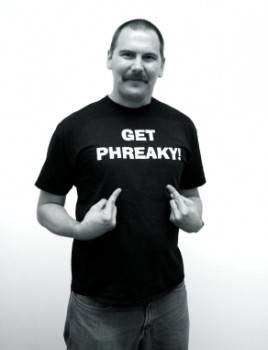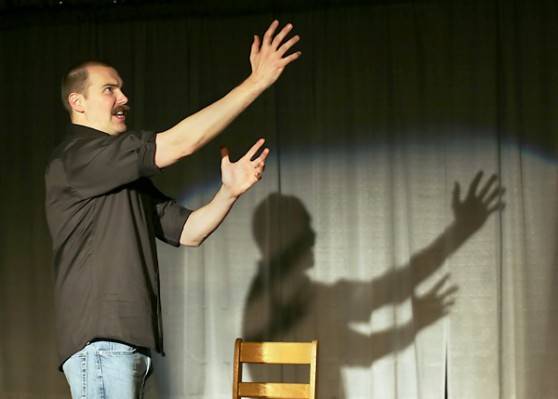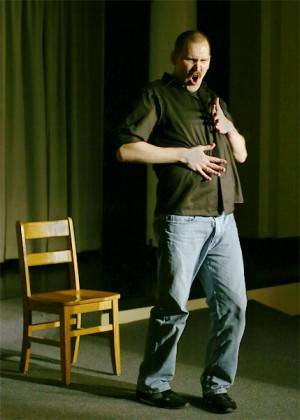
This is what I said at the moment of my conversion: I said, ‘Fuck it. Come in.
I quit.’~~Anne Lamott
This Friday, R. Dale Smith will bring his one-man show, Jesus Phreak: The Story of a Very UnLiKeLy Disciple, to Champaign-Urbana. Smith’s show tells the story of one man’s struggles, doubts, reluctance, and eventual acceptance of God. But this story is not morose; it is not meant to be a sermon, or even a lesson. Rather, Smith’s goal is to show us a different kind of Christianity. He intends to inspire us, no matter our beliefs or choices. And, especially, no matter our orientations. Jesus Phreak is a “uniquely poignant,” but extremely funny, provocative show whose message is universal to anyone and everyone willing to hear it.
***SPOILER ALERT***
Before he can fully accept God’s calling, Smith’s character must deal with the fact that every day he breaks Leviticus 19:19’s explicit rule that “neither shall a garment mingled of linen and woollen come upon thee” (KJV). Yes, he is a mixer. An evil, filthy mixer of materials. And it makes me feel dirty just typing this, I assure you.
***END SPOILER***
Smith agreed to speak with me about his own journey toward faith, his thoughts on Christianity, and what led him to write his one-man show.
~~*~~
Smile Politely: I’ll open with a silly question: why do you spell ‘phreak’ the way that you do?
Smith: I thought it would be visually interesting. I knew it would make people stop and look.
SP: Is this your first tour of this show?
Smith: I have been doing the show in addition to teaching at a university. I certainly wish that it was the only thing I did. Every time I perform, I come home and think, ‘I wish I could just travel the show,’ but I do work at a university and I love my job. I’m grateful for it. But I have been traveling with the show since the Fall of 2008, and how many shows I perform depends on how busy my semester happens to be.
SP: What religion were you raised in?
Smith: I was raised as Christian in rural Virginia in a very small Methodist Church, where my great-grandparents and my grandparents were buried. I think that all rural churches tend toward the conservative regardless of their denomination, but it wasn’t an ‘angry’ conservative at all. The congregation was not angry. They were country; they were conservative; but they weren’t angry. It was just a small Methodist church in rural Virginia, and in the show my character is a piano player in a church very much like the one in which I grew up.
When I was growing up, our church had a piano player who, when he was young, had been a girl, but by the time I came along, he was a boy. So we had a transgendered piano player in my little country church in Virginia. But everybody knew each other and we’d all grown up in this little southern place together, so that was OK because they knew him.
SP: That is so interesting. He didn’t get any negative backlash?
Smith: No, because everybody knew him. But of course, if these people went to the polls and had to vote on marriage equality for transgender people, they would probably say ‘no.’ But at the same time, they were fine having him there playing the piano and being friendly to him every week, but that’s just small town life.
SP: That happens all the time. That happens in families; it happens with friendships. ‘Come to the barbecue! We love you!’ But then they’ll go to the polls and vote against our civil rights, and they just don’t see ― there’s that disconnect ― they just don’t understand what they’re doing.
Smith: Right. That’s the type of place where I grew up.
SP: Were you out to your family and in your church?
Smith: No, I didn’t come out until college. I simply moved along in a haze. I wasn’t a tortured teenager ― ‘Am I gay? Am I not gay?’ ― I realized it very slowly. I came out in college and then I officially came out to my family when I was thirty. And by then, they had it all figured out anyway. My mom tried to pretend like it was a big deal.
SP: [Laughing] She felt like she needed to go through the motions?
Smith: [Laughing] Yeah.
SP: It’s the same with me. College for me. I told my brother first, and he said, ‘Tracy, it’s been pretty obvious for a while.’ I think he actually yawned.
Have you ever had a crisis of faith or have you always believed in God?
 Smith: It’s interesting. When I grew up, we went to church every Sunday. But when I began college, I stopped going to church because I was away and I didn’t have to, which is normal, I think. Later, on my own, I started reading a lot of theology and philosophy. I took a lot of philosophy and religion classes in college anyway.
Smith: It’s interesting. When I grew up, we went to church every Sunday. But when I began college, I stopped going to church because I was away and I didn’t have to, which is normal, I think. Later, on my own, I started reading a lot of theology and philosophy. I took a lot of philosophy and religion classes in college anyway.
That was the setting: I came out in college; I was out on my own; I was having my adult life. I was out. But I was also reading theology and philosophy, and I was reading theology that I found very compelling, that was making Christianity much more compelling than it had ever been in my little country church. It was then that faith became very meaningful for me.
I never had an ‘I’m too big for faith; I’m an atheist’ moment. I never had that moment. Ever. But I think that because I was so out when I started reading theology and taking my faith tradition seriously, I chose to read top-notch theologians who found space for different sexual orientations within the tradition.
And then in my late twenties, after my adult movement toward faith, when I started going to church again regularly, I made sure to check out different churches and find one where I could be out and feel comfortable. At that time I was living in Charlottesville, Virginia, and I attended a Presbyterian church, which was great. And because I was going there, when I decided to go to seminary, I chose a Presbyterian seminary.
SP: I often wonder why LGBT people stay in churches whose doctrine is anti-gay, when there are so many churches out there that are embracing and inclusive of everybody. What church are you a member of now?
Smith: I attend an Episcopal church here in Richmond, Virginia and I love it. The first place where this show was produced professionally was here in Richmond in that church. They really helped back the production in many ways and helped make it happen.
SP: What led you to write this one-man show?
Smith: It started at seminary. I took an elective class called “Images of Jesus,” where we looked at different artistic representations of Jesus over the centuries. The final project in the class was to either write a scholarly paper about one of the representations we’d studied or to create our own artistic representation of Jesus and present it to the class. So I asked the professor if I could do a performance piece. This completely threw him, but he cautiously agreed to it.
My move to faith in my twenties began with this weird dream that I had about Jesus. And so I decided to write a performance piece in which I comically explain, or talk about, this weird dream that I had about Jesus that had influenced me toward seminary. On presentation day, there were eleven PowerPoint presentations and then me. I talked about my dream and the class really liked it. I would see people on campus afterwards and they kept saying that they wanted to know what happens in my story. They wanted to know what happens next. But what happens next is ‘The End.’
But then I began thinking that maybe this could be a one-person show. So I took the piece ― which at that point was autobiographical ― and I expanded it by exploring LGBT experiences of Christianity. I wanted those gay issues in there. And that’s when I started thinking, ‘What would happen it I used this autobiographical germ and let it grow? What would it be like?’ And I let my imagination go.

SP: And why do you use a metaphor ― as hilarious as it is ― to discuss gay issues within Christianity?
Smith: The first thirty minutes of the show are pretty funny and I wanted to keep that comic tone. And I thought that if I came out to the audience after thirty minutes, even in front of people who are super liberal, I worried that part of them would think, ‘Oh, I have to be serious now.’
SP: ‘Now we’re all going to learn a lesson.’
Smith: Right. But by doing it with a metaphor, it’s still there. They know exactly what I’m talking about, but the tone stays the same.
SP: That’s brilliant.
Smith: When I started expanding the show and decided that I wanted to talk about gay issues, I almost immediately thought, ‘Do it in metaphor.’ I don’t know why that came to me, but it did.
The metaphor serves several purposes. One of them that I’m grateful for ― in addition to keeping the comic tone ― is that it raises the question of, ‘If this rule is in the Bible, and we’ve dismissed it, and now think of all the other rules that are there that have gone by the wayside, why do we still hang on to these supposedly anti-gay rules?’
 SP: And we ignore so many rules: We can’t eat shellfish; we must kill our wife if she’s not a virgin on her wedding night; we must kill witches, and so on. We ignore both behavioral and moral laws. And you highlight this in such a clever way, that people aren’t going to feel like they’re hearing the same arguments again, and they aren’t going to feel beat about the head with their own hypocrisy. It’s put to them in a joking manner.
SP: And we ignore so many rules: We can’t eat shellfish; we must kill our wife if she’s not a virgin on her wedding night; we must kill witches, and so on. We ignore both behavioral and moral laws. And you highlight this in such a clever way, that people aren’t going to feel like they’re hearing the same arguments again, and they aren’t going to feel beat about the head with their own hypocrisy. It’s put to them in a joking manner.
Smith: And it opens the show up to straight people and allows them to identify with it. I think that if I did just come out as gay, then our allies would feel outside of the story somehow. But by playing it as a metaphor, I think that anybody who’s ever felt like an outsider about anything can identify with the situation. An African American, female, Baptist pastor approached me after a show and told me that she was glad that I didn’t use the word ‘gay’ in my show because she was able to make the show her story too. She told me, ‘I don’t know what it’s like to be gay, but I know what it’s like to be an outsider. Being a woman pastor in a Baptist Church, I’m an outsider. Being an African American, in many ways, I’m an outsider. So I know what that’s like.’ So because of the metaphor, she was able to identify with the story in a way she couldn’t have if I’d actually presented myself as gay.
SP: So, really, your character is Everyman. Anyone who has ever felt ostracized for some reason ― his gender, her caste, his red hair, whatever ― that’s who you’re representing. That’s excellent.
Smith: Yes. Another aspect of the show that I think surprises people sometimes is that my character does not want to become a Christian. He spends most of the time doing everything he can, pulling every excuse out of the hat, to try to dismiss this weird Jesus dream he had that seems to be pulling him toward Christianity. But in the end, in the world of the show, it’s God’s persistence with wanting this particular person, God calling this person with a call that cannot be dismissed.
I also think this show presents a very realistic view of churches. Churches are not perfect in the show. Characters in the show are hurt by churches, and that is one of the reasons my character doesn’t want to become a Christian. But the show, I think ― I hope ― is saying that God is bigger than churches. And God calls people, regardless of what humans and churches do.
SP: I’d like to ask you what’s perhaps a difficult question, and it speaks to your statement that God is bigger than churches, or synagogues, or mosques ― bigger than even our human understanding of what God is.
My question is that the law in Leviticus that this show is actually based around is not just a Christian belief, obviously. It’s a law in the Hebrew Bible, not the New Testament. Does your show focus solely on Christians? Or does it focus on every religion that follows the Hebrew Bible and agrees with that law?
Smith: The show is a very Christian show. I’m mainly exploring the faith tradition of Christianity and some of its basic tenants. And I’m making fun of a lot of its basic tenants over the course of the show. But that said, other faith traditions are mentioned over the course of the show also.
SP: It makes sense to me that you focus mostly on Christianity, because in this country it’s mostly Christians who use Leviticus to beat us about the head, for sure.
Smith: The show is really exploring Christianity. Judaism and Islam are mentioned in passing, but I do not explore them the way that I explore the basic tenants of Christianity.
SP: When you were writing this show, was it with the intent to teach as well as entertain?
Smith: The main point was to entertain. I’m uncomfortable with the word ‘teach,’ but what I wanted to reveal or put forth in the show was an alternative version of Christianity that is something other than the ‘believe in Jesus, who died for your sins’ Christianity. That paint-by-numbers, do the checklist, ‘have you given your soul over to Jesus’ Christianity is what my character makes fun of, and over the course of the show, a more intellectually fulfilling portrait of Christianity emerges, which is more about what affects life in the everyday world, like how one might live.
My target audience for this show ― the people that I want to entertain and challenge ― is, number one, gay people. I want to let them see themselves and their experiences on stage. I want to reveal a positive faith experience on stage for them. Second, I’m targeting people who, for whatever reason, have dismissed Christianity as being ridiculous or as being only conservative or only about believing that Jesus died on the cross for our sins. I hope to present a picture of the faith tradition that may challenge them and make them think about it again ― to give it a second look. This is not to say that I want to convert them or anything, but just to deepen their understanding of what Christianity can be.
SP: Alright, I accept that challenge [Laughs]. One of my favorite bloggers is a gentleman named Fred Clark, who is a liberal Christian. He writes about politics, the economy, music, and he makes fun of the Left Behind series. And I know that when I go to his blog that I’m going to be reading essays by a devout Christian whose writings are influenced by ― and sometimes about ― his beliefs, but it’s fine with me because he does what you’re doing. He shows me a face of Christianity that I never saw growing up, that we don’t see in the newspapers or on television. And so, it’s actually one of the things I enjoy about him. And I’m looking forward to your show for the same reason.
I do have one final question. I work with a girl who is the girliest girl who was ever a girl. She’s wonderful. And she told me to ask you this question and to be serious about it:
I am a fashionable, straight woman and you are an artistic, gay man. Do you really not consider cotton/polyester blends an abomination? I simply do not believe you.
[Laughter] [More laughter]
Smith: That is hysterical.
[Much more laughter]
Smith: I have to say in real life that I do tend toward the 100% cotton. [Laughs]
SP: She’s going to be so happy to hear that, because her world was turned upside down when I told her about your show.
[Laughter, laughter, laughter]
 SP: Thank you so much, Dale.
SP: Thank you so much, Dale.
Smith: Thank you!
Jesus Phreak is promoted by the National Gay and Lesbian Task Force‘s “Institute of Welcoming Resources.” It is being presented by The UP Center of Champaign County.
Time: Friday, Oct, 14, 7:00–8:15 p.m.
Q&A, 8:15–10:00
Location: Community United Church of Christ
This event is free and open to the public.
Official Trailer:
All photos used with permission.








